Choosing the right water heater for your home is essential for comfort and energy efficiency. With various types out there, choosing the best one needs to be done to understand the benefits and features of each type so that you can make a decision based on your household’s needs. From traditional tank heaters to more energy-efficient options like tankless and solar models, the variety of water heaters today can meet a wide range of demands, whether you’re looking to save space, reduce energy consumption, or ensure a constant hot water supply. In this guide, we’ll take a look at the different types of home water heaters and offer a rundown of their pros and cons so you can decide for sure which one is best for your household.
Types Of Water Heater: Explained
Generally, there are various types of water heaters, but we mention the 5 most significant types that are used on a commercial basis. We will give you an in-depth explanation of this.
1) Tankless Water Heater
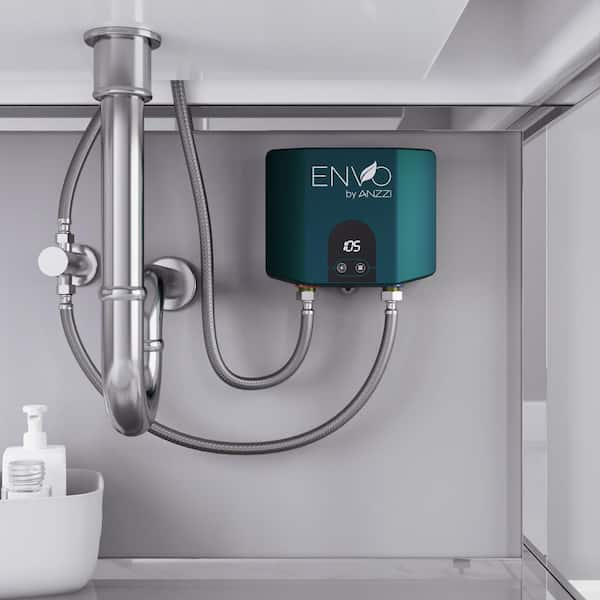
Image Source: thehomedepot.com
A tankless water heater mentions that it functions without a tank and works for a large heating capacity. It can heat the water in an instant and is very quick and efficient. Hence, this type of water heater is currently installed in most households.
There are various heating capacities available, and if you are planning to run the tankless water heater on electricity, then you will be required to increase the electrical capacity of your household for the water heater to function appropriately.
This may lead to a rise in the electricity bills but will heat the water quite quickly and efficiently.
A tankless water heater may not require much maintenance, but you must get it cleaned at least once a year to avoid corrosion of the pipes and connections. It has parts that are too tiny and delicate to handle; hence, their cleaning might be challenging.
Appropriate cleaning and maintenance will help the geyser last for a good 8-10 years. The best part of the tankless water heater, which makes it an on-demand product, is its instantaneous water heating capability that gives you piping hot water right in a jiffy.
However, if you are looking for something in a larger capacity, it might consume more electricity, leading to additional costs.
2) Traditional Storage Tank Water Heater
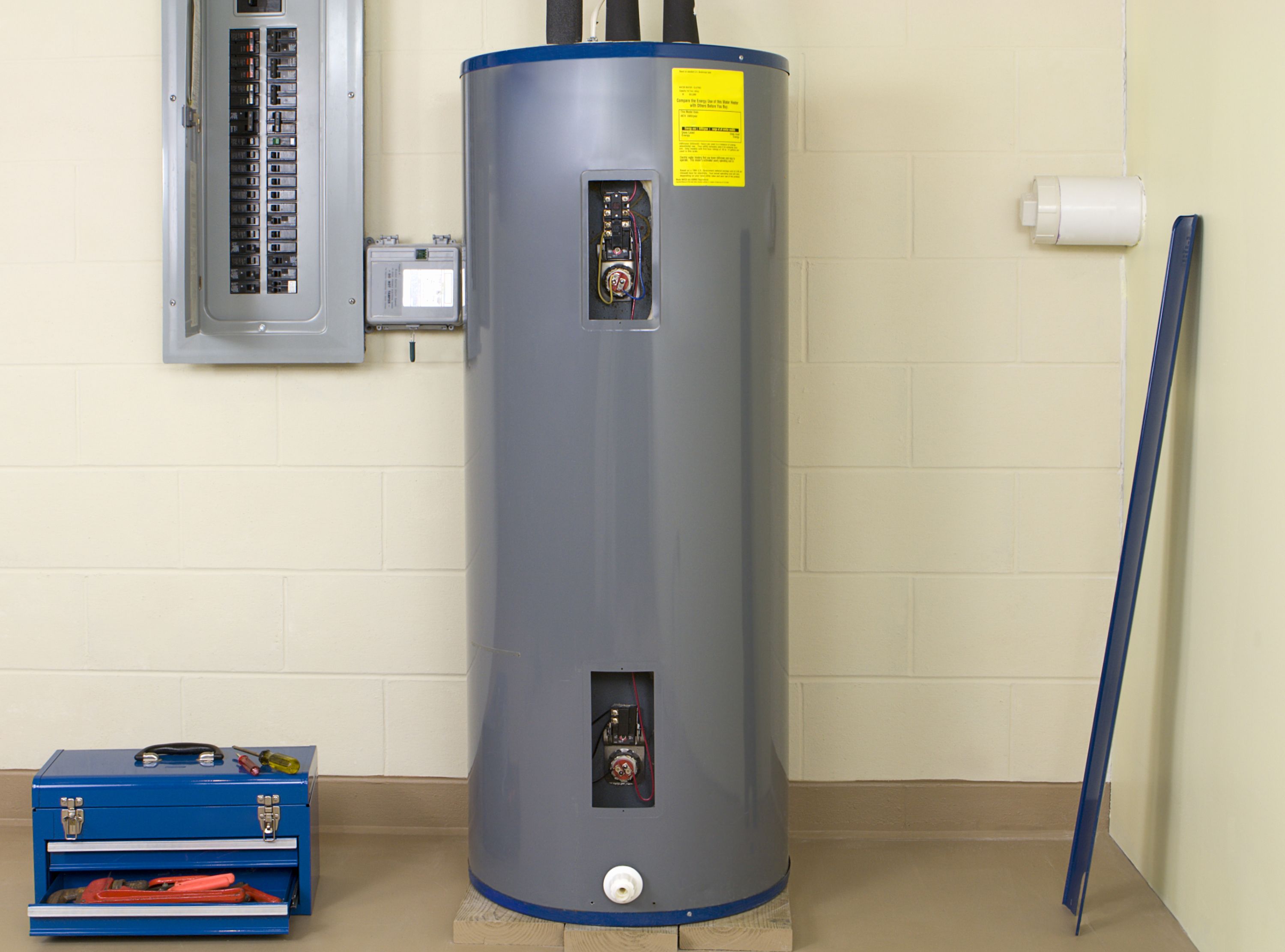
Image Source: popularmechanics.com
The storage tank water heater works like an insulated thermos that heats the water and stores it in a tank having a particular capacity. The tank’s capacity helps determine how much warm water is available for storage and ready for use. These types of conventional water heaters come with two valves, one for controlling temperature and the other for controlling pressure.
The temperature and the pressure control valves work differently, with the temperature control valve being released from time to time once you need to release a certain amount of heat for moderating the temperature level. The water can reach up to a maximum temperature of 120 degrees Fahrenheit. The pressure control valve releases and reduces the pressure once it reaches 150 psi.
The only issue you might probably face with these types of water heaters is the storage, as there are more people at home. You would require a larger space in the bathroom and a larger storage tank.
Maintenance involves cleaning the internal parts regularly to prevent corrosion and enhance the water heater’s lifespan.
The dirt and sediments will include minerals and other deposits that need to be cleaned and replaced regularly. The good thing about these storage traditional types of water heaters is that they are easy to maintain and install.
In terms of cost, they are affordable. In terms of efficiency, the water heater performs well but is quite slow as it will refill up to the given capacity and only then heat the water, which makes it very time-consuming.
3) Condensing Water Heater
Condensing water heaters are the smartest of all water heaters and are also very energy efficient as they use the surrounding temperature to heat the water. A condensing water heater is a great option for those who use natural gas resources. The water heater can extract energy from natural gas sources, absorb energy, and heat the water within the tank.
This energy tends to pre-heat the water, which then enters the boiler. This also works as a tank storage system; the heating procedure within the tank is a lot different. It heats by using the heat around you. Usually, the base of the water heater has heating coils.
The gas expelled at your home through natural gas sources is absorbed, and the coils help heat the gas, which in turn heats the water that passes through the cold-water inlet giving you resourcefully utilized warm water at all times.
The maintenance of the condensed type water heaters is not much. It is very similar to the other types. The gas exchange pipes can get choked up due to pollutants and need to be cleaned regularly.
If you have a large family or too many members in your house, then the condensation type is very cost-effective as it usually comes with a large storage tank for exchanging the gas and capturing the heat. However, for houses that do not use natural gas as their fuel source, then the condensing type water heaters are not very effective.
4) Heat Pump Water Heaters

Image Source: canarymedia.com
Heat pump water heaters work on a hybrid system and do not exactly make use of electricity. Instead, they have a dual way of working, which also helps you save on heating and water costs.
Here electricity is used only when the heat has to be captured and transferred into the water tank to warm the water. It has a very unique mechanism and uses electricity only for the basic purpose of transferring it to the water.
It consumes 60% less energy as compared to other types of water heaters. However, the space required for its installation is more, so you would need approximately 10 feet from the ground to the ceiling to install these types of water heaters.
Here, the heater does come with a tank for storage, and regular maintenance involves cleaning the tank and the geyser model once every 6 months.
The advantage of this heater is that it consumes less electricity for transferring purposes, making it very cost-effective. However, when it comes to efficiency in functioning, the water heater may not work efficiently as it tends to absorb temperatures from the surroundings.
If the ambient temperatures usually remain cold, then the machine is almost useless. And since it involves such a unique mechanism, the machine setup is very costly as well.
5) Solar Powered Water Heater
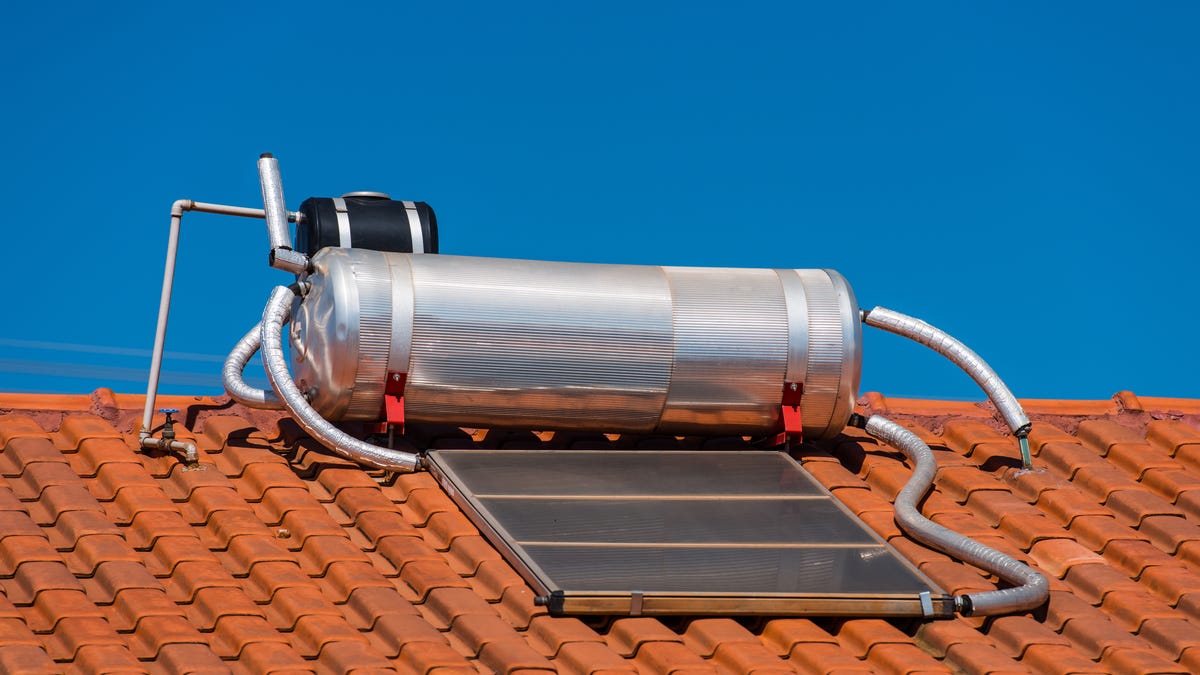
Image Source: cnet.com
This is the most conventional and cost-effective method of water heating. If you have ample space in your home, you can easily set up solar panels in an open backyard or terrace with enough sunlight.
These solar panels comprise solar cells that absorb the heat energy from the sun and slowly transfer all the heat through a closed-loop system. This closed-loop has a heating fluid, which is an anti-freeze fluid that is transferred to the water tank to heat your water.
This system also works great for places with high temperatures and a warm ambiance. Here, you must maintain the solar panels and tank to store the water. However, for winters and rainy seasons, when you will not receive ample sunlight, you need an alternative energy source like electricity or natural gas.
The advantages of using a solar-powered water heater are that you contribute to the environment, save on electricity bills and non-conventional energy sources, and keep getting unlimited hot water in sunny weather.
However, the major drawback is the investment you make in solar panels. Secondly, despite having solar panels, if you still need an alternate energy source, solar water heaters add up to your budget and are a futile investment.
6) Point-of-use (POU) Water Heater

Image Source: youtube.com
Unlike a central heating unit, a point-of-use water heater heats water at the point of use. This is energy efficient since the central heating system doesn’t have to be connected to heat water. Additionally, with POU electric water heaters, You should know that a POU might also be an effective option for heating hot tub water, depending on how much hot water you need.
However, these electric water heaters cannot support a household’s entire hot water demand when the central water heater isn’t working. Therefore, they are unsuitable backups for the main hot water heaters.
There are a few reasons you should consider a point-of-use water heater. Some of them are:
-
- If the home cannot be built to reduce losses using a more efficient central heater
-
- When an additional water load is required for additions, consider installing a POU heater and running the main plumbing on cold water.
-
- Install a POU for hot tubs if the water is heated by electricity.
Factors to Consider Before Purchasing a Water Heater
Of course, before making a large purchase for your favorite heater, there are criteria you should go through to ensure you make the right choice. Here are a few:
1) Energy Efficiency

Image Source: hvacservices.com
A yellow Energy Label on most heaters provides estimates of a water heater’s annual operating cost and energy efficiency for use in your home. The costs of other, potentially more or less energy-efficient models can then be compared.
You can then calculate the financial savings and payback time of purchasing a more energy-efficient model, which may have a higher initial cost. Keep in mind that conventional water heaters account for at least 20% of your home’s energy use. Therefore, a water heater is more efficient with a higher energy factor.
While investigating whether your tankless water heaters are energy efficient, compare the fuel sources. Remember, the fuel sources don’t always translate into lower annual operating costs.
b) Size
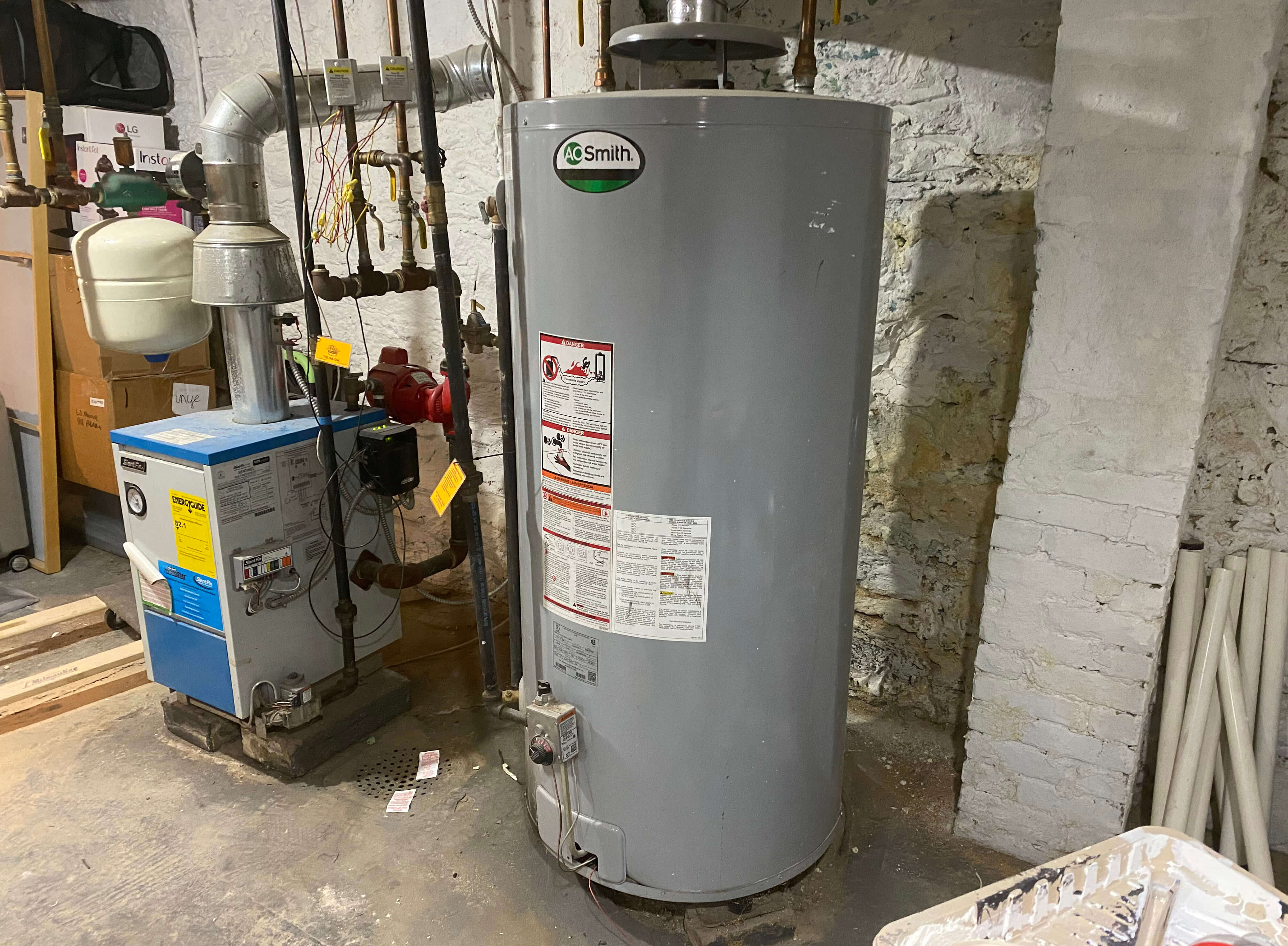
Image Source: brownstoner.com
Determining the size of water heaters depends on their storage tank volume. Of course, for one to three people, a small (50- to 60-gallon) storage tank is typically adequate. For three to four people, a medium (80-gallon) storage tank works well. For four to six people, a large tank is suitable.
The solar storage tank for active systems grows in proportion to the collector size, usually 1.5 gallons per square foot of collector. This means that, with a conventional water heater, when there is little demand for hot water, the system is kept from overheating. Some experts advise increasing the ratio to at least 2 gallons of storage to a 1 square foot collector area in hot or sunny climates.
c) Type of Fuel, Availability, and Cost
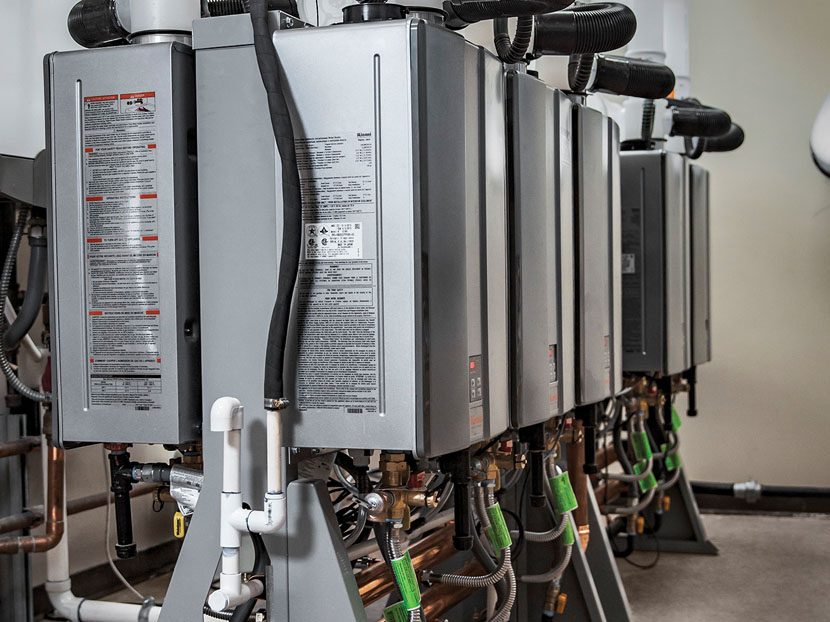
Image Source: phcppros.com
The fuel you use to keep your tank hot matters since it affects your water heater’s annual operation costs, size, and energy efficiency. Here are water heater options when it comes to fuel.
Electric water heaters use big coils that hang down into the tank. The coils resemble those found in electric ovens. Electricity is more expensive than natural gas or propane, and electric water heaters are generally less efficient than those powered by other fuels. However, they don’t call for venting and are less expensive upfront. It might be a good option if your water demand is minimal and you don’t mind a cold shower occasionally.
Natural gas utilizes a bottom-mounted gas burner and a venting chimney that extends through the middle and out the top of the tank. Through your home’s chimney or a side wall vent, the carbon dioxide and water vapor waste products are expelled outside. The flame is created by an electric spark or a gas pilot light. Although more expensive than electric water heaters, natural gas water heaters are more cost-effective.
Much like natural gas, propane works similarly but burns propane as fuel. In cases where a house lacks access to natural gas, propane is typically used as a fuel source. A sizable tank on the property is used to supply the propane. Propane can be used for residential water heaters. Propane is also cheaper compared to electric water heaters.
On the other hand, you can also use oil to produce hot water since it uses a power burner to combine oil and air to create a vapor mist that is then started by an electric spark. When natural gas is not available, oil heat is frequently used. Oil heat is similarly delivered to the location and is kept there in storage tanks for conventional heaters.
d) Annual Operational Costs
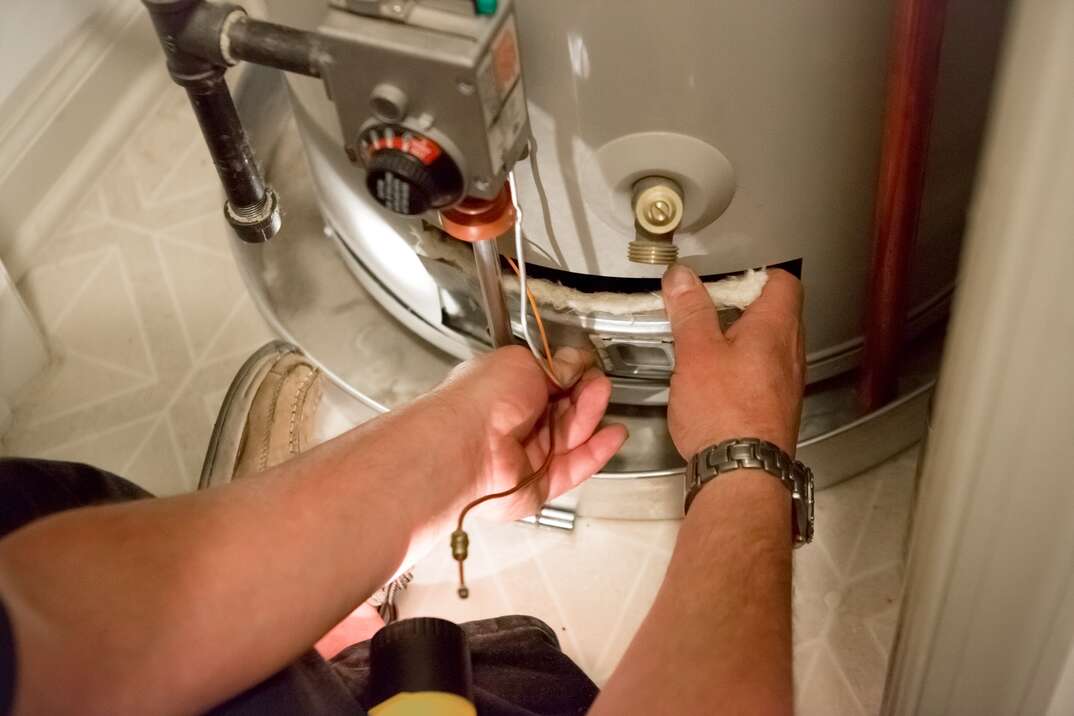
Image Source: homeserve.com
Before selecting the type of water heater tank you prefer, be it a tankless or storage water heater, ensure you know the annual costs. Tank and storage water heaters cost less than tankless water heaters in terms of both initial cost price and installation. However, the annual operating costs are lower for tankless water heaters.
Frequently Asked Questions About Different Types of Water Heaters
i) What is the most common type of water heater?
The most common type of water heater is known as a tank water heater due to the large storage tank where the heated water is kept until it is needed.
ii) What are the two types of hot water tanks?
-
- Conventional storage water heaters offer a ready reservoir (storage tank) of hot water, which is adequate for everyday use.
-
- Tankless or demand-type water heaters heat water directly without the use of a storage tank.
iii) What are the different types of instant water heaters?
Also known as point-of-use water heaters, there are two main types of water heaters. They are tank and tankless. Furthermore, they just look like a much smaller version of a traditional tank water heater.
iv) What type of water heater is safest?
Electric water heaters are the safest for home and residential use. They are also safer than gas water heaters because there is no gas line, burner, or pilot light.
v) Which water heater is long-lasting?
Tankless water heaters last between 20-25 years, making them the longest-lasting water heaters on the market. Solar, condensing, and heat pump models all last 15 years or more, whereas point-of-use and tank heaters usually last over a decade.
Final Note
Choosing a water heater is not easy. It requires you to understand a lot of technical aspects regarding the coils, the heating mechanism, and the various features that a water heater can offer, like cost-effective, efficient heating performance, etc.
Our guide on the different types of water heaters will help you drive the confusion away and aid you in choosing the best water heater as per your suitable requirements. Remember, based on the quantity of hot water produced per unit of fuel and consumed in a day, the energy factor calculates how energy-efficient your water heater is.















